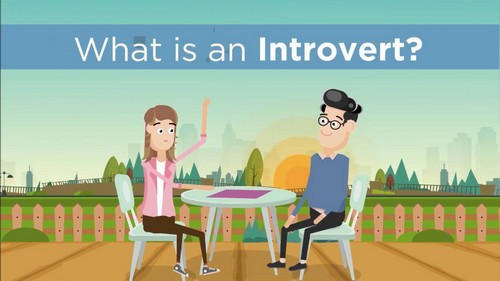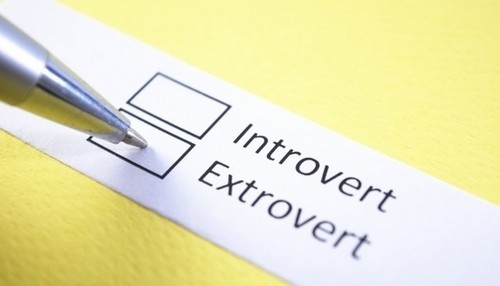
Introverts vs Extroverts: Understanding the Differences

Discover the nuances between introverts and extroverts While not absolute, introverts tend to be more reserved and enjoy alone time while extroverts thrive in social situations and gain energy from being around others Explore the common traits of each to better understand these personality types
Human personalities are not absolute and the introvert and extrovert labels are not exceptions. While many people identify with one of these labels, they often dismiss those who are too quiet as introverts and those who are too outgoing as extroverts. Unfortunately, introverts are often misjudged as being too shy when in reality, shyness is a common trait that can be found in any personality type. It's important to note that introverts don't necessarily always want to be alone, but rather prefer smaller, more intimate gatherings with people they feel comfortable with. A person's personality type doesn't determine their friendliness, but rather how they react in certain situations. Extroverts tend to crave socialization while introverts prefer quieter situations and tend to shy away from socialization.
In this article, you learn about both personality types along with their personality traits and differences between them.
Who is an Introvert?
Introverts are often perceived as individuals who prefer to spend time with their own thoughts and ideas. However, it is important to note that introversion does not necessarily equate to shyness, as introverts may simply choose to avoid social gatherings and public interactions. Unlike shyness, which is often associated with nervousness and uneasiness, introversion does not have a negative connotation attached to it. Another common misconception about introverts is that they do not have friends, which is not necessarily true.
Introverts may not easily form friendships, but when they do, they tend to have a few deep and meaningful connections. In fact, introverts can be just as open with their friends as extroverts. Despite being perceived as unsuitable for leadership roles and lacking in the ability to establish business relationships, introverts excel at maintaining strong personal relationships and can also succeed in their chosen careers. Many introverts are drawn to careers that involve minimal human interaction, such as engineering, accounting, long-haul driving, writing, or other forms of artistic expression.
Common Introvert Traits
1) They don’t enjoy to be the center of attention.
2) Prefer to spend time in solitude.
3) Think before they speak and are usually taciturn.
4) Give more importance to a one-on-one relationship.
5) Love to work in independent and quiet environments.
6) Requires a lot of alone time to recharge and introspect.
7) Usually reserved in nature.
8) Deeply focused and always think about limited interests.
Who is an Extrovert?
Extroverts thrive off the energy of their surroundings, whether it be people or things. They tend to be the center of attention in most gatherings they attend and have a natural ability to connect with others. While there is no conclusive research on how extroverts and introverts react differently to change, extroverts' large social circles and ease in making new friends make it easier for them to adapt. They also have more social support from their friends during major life events compared to introverts. Additionally, society tends to be more drawn towards extroverts than introverts.
Extroverts are well-suited to the world we inhabit, where success is often determined by one's ability to connect with others in various settings, from job interviews to romantic dates. As a result, they tend to thrive in leadership positions and excel in people-centric roles such as marketing, entertainment, sales, advertising, and public relations. However, it's important to note that extroversion is just one aspect of a person's complex personality. To fully assess someone's suitability for a particular role, we must consider other traits as well. For example, there may be a significant difference between an extrovert who is agreeable and one who is loud and prone to making rude or inappropriate comments.
Common Extrovert Traits
1) Love being the center of attraction.
2) Tends to have a great social network.
3) Take decisions quickly.
4) Think out quite loudly.
5) Positive, outgoing, and enthusiastic.
6) Recharge their energy by being with a lot of people.
7) Love to work in team-oriented and open work settings.
Difference between Introverts and Extroverts.
IntrovertsExtroverts
For introverts, solitude is a source of energy replenishment, while extroverts draw energy from social interactions. Although introverts may have a smaller social circle, the relationships they do have are often deep and meaningful. On the other hand, extroverts tend to have a larger network of friends, but the connections may not be as strong.
When it comes to social interactions, introverts tend to thrive in one-on-one conversations, while extroverts enjoy the energy and dynamism of group discussions. However, introverts may struggle when it comes to adapting to change, as they typically prefer routine and familiarity, whereas extroverts tend to embrace new experiences and challenges with greater ease.
Introverts usually love to listen more.Extroverts usually love to speak more.
Introverts are generally reserved in nature.Extroverts are generally open in nature.
When it comes to maintaining focus, introverts tend to excel. They have the ability to deeply concentrate on a task for extended periods without becoming easily distracted. In contrast, extroverts often struggle to maintain focus on a singular task for long periods, making them more susceptible to distractions. Additionally, introverts tend to take their time when making decisions, reflecting on various factors before ultimately coming to a conclusion. On the other hand, extroverts rely on their intuition to make decisions quickly.
21. This difference in personality traits can also affect communication styles. Introverts tend to be more reserved and may prefer written communication or one-on-one conversations. Extroverts, on the other hand, may enjoy group discussions and thrive in social situations.
Introverted individuals tend to avoid being in the spotlight, while extroverts thrive on being the center of attention. When it comes to expressing their opinions, introverts tend to speak up only when prompted, whereas extroverts are more likely to actively participate in meetings and freely share their thoughts.
Overall, it is important to recognize and appreciate the diversity of personality types in the workplace and understand how to effectively manage and motivate individuals based on their unique traits. By doing so, not only will employees be happier and more productive, but the organization as a whole will benefit from a more harmonious and successful work environment.










